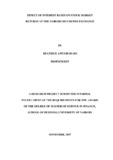| dc.contributor.author | Oloo, Beatrice A. | |
| dc.date.accessioned | 2018-01-12T06:18:33Z | |
| dc.date.available | 2018-01-12T06:18:33Z | |
| dc.date.issued | 2017 | |
| dc.identifier.uri | http://hdl.handle.net/11295/102336 | |
| dc.description | A Research Project Submitted In Partial Fulfillment of the Requirements for the Award of the Degree of Master of Science in Finance, School of Business, University of Nairobi | en_US |
| dc.description.abstract | Many studies have been undertaken to establish whether interest rates changes affects stock markets. Theoretically, the stock markets would respond more significantly in the short term since interest rates have a greater impact on the stability and conditions of the financial market since they affect the assets prices and returns. Keeping all other factors constant, the Central Banks (CBs) interventions are thus said to be efficient. Conversely, if the change in stock market returns as a result of changes in interest rates is significant, the changes that central banks would expect to see in the financial sector in order to achieve their macroeconomic objectives such as economic growth and inflation targets are unlikely to be made. This study sought to determine the effect of interest rates on stock market returns at the NSE. The independent variable was interest rates as measured by monthly CBK lending rate. The control variables were inflation rates as measured by monthly CPI and exchange rates as measured by monthly exchange rate between ksh and usd. Stock market return was the dependent variable which the study sought to explain and it was measured by monthly returns computed from the 20 share index. Secondary data was collected for a period of 10 years (January 2007 to December 2017) on a monthly basis. The study employed a descriptive research design and a multiple linear regression model was used to analyze the relationship between the variables. Statistical package for social sciences version 21 was used for data analysis purposes. The results of the study produced R-square value of 0.113 which means that about 11.3 percent of the variation in stock market returns at the NSE can be explained by the three selected independent variables while 88.7 percent in the variation was associated with other factors not covered in this research. The study also found that the independent variables had a weak correlation with stock market returns (R=0.337). ANOVA results show that the F statistic was significant at 5% level with an F statistic of 4.949. Therefore the model was fit to explain stock market returns at the NSE. The results further revealed that individually, interest rate is not a significant determiner of stock market returns while exchange rates and inflation are statistically significant determinants of stock market returns at the NSE. This study recommended that there is need for central bank to regulate the interest rate levels prevailing in the country bearing in mind that they influence stock market returns. | en_US |
| dc.language.iso | en | en_US |
| dc.publisher | University of Nairobi | en_US |
| dc.rights | Attribution-NonCommercial-NoDerivs 3.0 United States | * |
| dc.rights.uri | http://creativecommons.org/licenses/by-nc-nd/3.0/us/ | * |
| dc.title | Effect of Interest Rates on Stock Market Returns at The Nairobi Securities Exchange | en_US |
| dc.type | Thesis | en_US |



